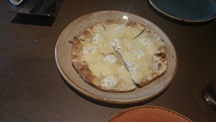FORNI
FORNI ⇐ Click here
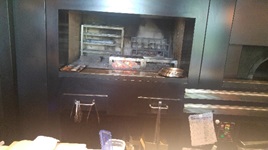 HOTEL THE MITSUI restaurant FORNI kiln |
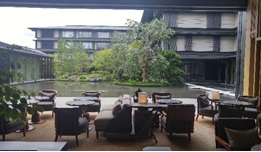 Lobby |
Forni means two kilns in Italian. HOTEL THE MITSUI, located in Nijo Castle East, opened last fall. I visited the restaurant FORNI on the first floor in June. I used to visit the Kyoto International Hotel in this area since I was a student. The gardens were nice, but the new hotel gardens were transformed into more familiar gardens.
The newly completed hotel was designed by foreigners, but I was impressed by the design that beautifully expresses the splendor of Japanese houses, and the Japanese extracts are scattered here and there more than Japanese.
The building was designed so that we can feel the nature of the four seasons with all five senses, and it tickles the Japanese sensibility. Although we were in Rakuchu, I was able to enjoy the quiet air and spend a relaxing time.
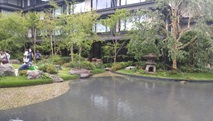 |
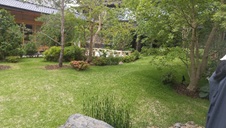 |
There are many flowers in the garden and there we can take a walk, furthermore butterflies are flying.
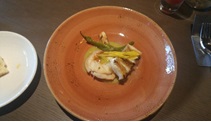 Kiln-baked lobster and sea bream |
|
The lobster and sea bream baked in the kiln brought out the flavor of the ingredients, and the fragrant aroma of the kiln drifted on the plate, and it was delicious. The pizza was also a Roman-style pizza with truffles, and it was refreshingly delicious. Chef Shozo Sugano’s experience in Italy and his perfectionist personality were all on the plate, making it the ultimate exquisite dish. I enjoyed everything from appetizers to desserts.
The structure of the Italian kiln is different from that of the Japanese kiln, but it is common throughout the world to make the material delicious with the structure of the firepower and the kiln. I have heard from a French person before that there are only seven craftsmen who can make kilns in France.
At the “Okudo-san Summit : Traditional Cooking Stoves” held every year at the end of the year, I feel the splendor of Okudo-san culture. I would like to work to transmit and inherit the wonderful Okudo-san culture, which is a mixture of scientific Okudo-san’s functions and natural energy, soil, fire, and wood. Every day I want to play a role in conveying and inheriting the culture of living that conveys the splendor of Kamado to the world.
The end of document

